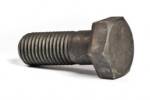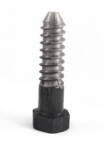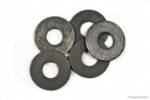ASTM FAQs

Head Style Requirements
Do ASTM and SAE Grades Require a Specific Head Style?When selecting an ASTM grade of fastener for a particular application, the chemical and mechanical requirements are normally considered first, but there are some fastener specifications that require a certain head style as well. Below is a chart showing some common ASTM grades and whether or not they have requirements for the pattern of forged... Read more
F2329 Classes
Are there classes in the ASTM F2329 galvanizing specification similar to ASTM A153?The A153 specification has 4 classes of material for hot-dip galvanizing: A. Castings – Malleable Iron, Steel B. Rolled, pressed, and forged articles C. Fasteners over 3/8” in diameter, washers 3/16” to 1/4” thickness D. Fasteners 3/8” inch in diameter and under, washers under 3/16” thick F2329 was created out of A153 to further define the... Read more

A325 Lag Screws
Can Portland Bolt manufacture A325 lag screws?Even with the new F3125 specification that covers A325, Portland Bolt would not manufacture lag screws to F3125 Grade A325. According to section 1.2.1 under Intended Use in ASTM F3125, “Bolts manufactured under this specification are intended for use in structural connections covered in the Specification Joints Using High-Strength Bolts, as approved by the Research... Read more
A193 Grade B7 vs. SA193 Grade B7
What is the difference between A193 Grade B7 and SA193 Grade B7?A193 is an ASTM (American Society for Testing and Materials) specification, whereas SA193 is from ASME (American Society of Mechanical Engineers). ASME repurposed the ASTM specification and added an “S”. The primary difference is the application. While both specifications are designed for high temperature / high pressure service, SA193 may also be used in nuclear... Read more
A687 Fasteners
Can I order bolts to the ASTM A687 specification?ASTM A687 was withdrawn in 1999. The specification covered high-strength non-headed steel bolts and studs. Below are the mechanical properties as well as Charpy Testing requirements: Yield Strength (KSI) Tensile Strength (KSI) Elongation % Reduction of Area % Foot-Lbs (Ave-min) Temperature 105 Min. 150 Max. 15 Min. 45 Min. 15 -20F While it is possible... Read more
Weathering Steel F1554
Do F1554 anchor bolts come in weathering steel?No they do not. F1554 is a carbon steel, carbon boron, alloy, or high-strength low-alloy specification. F1554 has 3 strength grades, 36, 55, and 105. These numbers correspond to the minimum yield strength required. If corrosion resistance is required, F1554 anchor bolts can be hot-dip galvanized to the F2329 specification. If weathering steel anchor bolts... Read more

Stainless A325
Can I get A325 bolts in stainless steel?The short answer is, “No, you cannot match the A325 strength with stainless steel.” Some grades of strain hardened or quenched and tempered stainless steel fasteners will exceed the A325 strength requirements, but most standard stainless fasteners are not nearly as strong as A325 bolts. These bolts are very different chemically. Whereas stainless steels consist... Read more

F436 vs F844
Are you allowed to substitute F436 hard washers when F844 cut washers are called out?In general substituting one grade of fastener for another is a bad idea, as that substitution can open you up to liability concerns, but does this apply to washers? ASTM F844 covers standard, unhardened steel washers for general use. ASTM F436 covers hardened steel washers used with most high strength bolts and F1554 anchor bolts. F844 is... Read more

A36M55
My plans specify A36M55. Is that a bolt grade?A36M55 is an outdated call out for anchor bolts primarily used by the light pole and traffic signal industries. It was used to specify ASTM A36 steel (36 ksi yield strength) that had been chemically modified to develop a minimum 55 ksi yield strength. In 1994 the F1554 specification was introduced, and F1554 Grade 55... Read more

Galvanizing A193 B7 Bolts
According to the information you give in your site, ASTM A193 Grade B7 can be galvanized. However, this material does not have a maximum tensile strength. Thus, it is possible to have ASTM A193 Grade B7 bolts with a tensile strength higher than 150 ksi and in this case, bolts should not be galvanized. What is your experience about this matter and how high can the tensile strength be in a current production?The concern with galvanizing any high strength steel is the risk of hydrogen embrittlement. There is plenty of research on galvanizing high strength steels, but conclusions vary on the strength at which hydrogen embrittlement will likely occur when the parts are galvanized. Some research identifies 150 ksi tensile strength as a threshold, but other research... Read more
